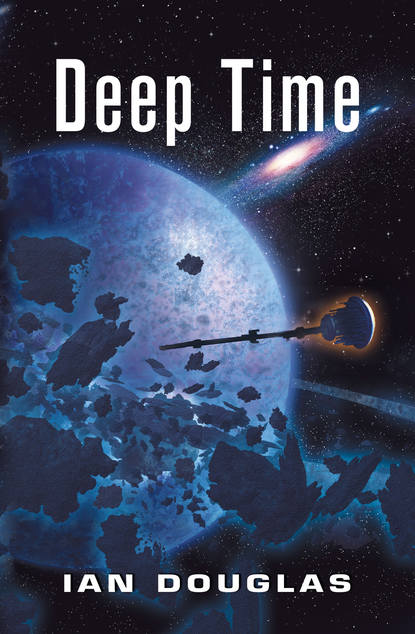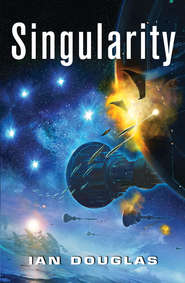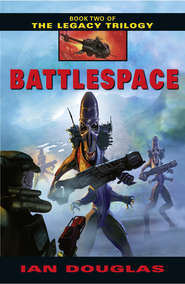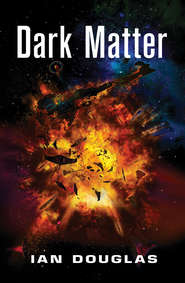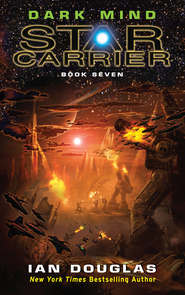По всем вопросам обращайтесь на: info@litportal.ru
(©) 2003-2025.
✖
Deep Time
Настройки чтения
Размер шрифта
Высота строк
Поля
The alien was growing huge in Dahlquist’s inner mind’s-eye window.
“Wave off, Concord! Wave off!”
“Negative,” Dahlquist replied. “We’re going in.”
And then things began to get exciting.
Chapter Six (#ulink_5a91c7d9-32ea-505e-85c3-0bc77cfd108f)
29 June, 2425
USNS/HGF Concord
Charlie One
0750 hours, TFT
Concord had closed to within a hundred meters of the alien when the sleek gray-green hull directly ahead … changed.
“Fire!” Dahlquist screamed. “All weapons … fire!”
It was a response of pure and immediate panic. Concord’s weapons included lasers, particle beams, and missiles—these last tipped with variable-yield fusion warheads. Firing a spread of Krait missiles into a target that close would have meant incineration for the High Guard vessel.
The command was overridden, however, both by Concord’s AI and by Lieutenant Jeffry Thomas, Concord’s chief weapons officer. The ship’s beam weapons, though, slashed into the alien with what looked like deadly effect. Portions of the hull melted and flowed like syrup, heavy and viscous.
“Captain!” Concord’s helm officer yelled. “We’ve lost control!”
“Damn it, what’s happening?”
“We’re being dragged into that thing!”
Concord drifted forward, accelerating … then plunging into that seething, flowing surface. The liquid peeled back like a blossoming flower, then closed around and over the Concord as Dahlquist’s view was submerged in darkness.
And with a hard jolt, the Concord came to rest.
VFA-96, Black Demons
Charlie One
0751 hours, TFT
“They’re gone!” Connor screamed over the squadron’s tactical frequency. “That thing just fucking swallowed the Concord!”
She felt a surge of panic—a churning, tumbling, empty feeling that had her weak and shaking. Too well, she remembered her fighter being swallowed by a Slan warship seven months ago, out at 36 Ophiuchi AIII.
Damn, she’d thought she was over this. The psychs had probed and analyzed and, where possible, smoothed over her memories of the interrogation, separating the emotion from the simple facts of the events.
“Take it easy, Five,” Mackey told her.
“But what do we do?”
“Get ahold of yourself, Connor! That’s first!”
She gulped down several breaths, struggling to control herself, her fear. The psych sessions had taught her how to engage certain circuits within her cerebral implants.
And the alien monster wasn’t coming after her …
“I’m … okay …” she managed to say.
“Right. All fighters—nice and easy—start pulling back. No moves that can be considered hostile.”
“Might be a little late for that, boss, don’t you think?” Lieutenant Gerald Ruxton pointed out. “Concord was letting loose with everything she had. Of course the aliens think we’re hostile!”
“As long as they’re not shooting at us,” Mackey said, “I think we’re okay.”
“They haven’t done anything yet,” Martinez observed.
“Except eat the Concord!” Connor added.
“Well,” Mackey said, “Concord’s captain was talking about boarding the alien. Looks like he’s just done precisely that. Everybody just keep it cool. And increase your distance. We’ll back off to a couple of hundred kilometers. Slowly …”
It was, Connor thought, a damned peculiar problem. Were they under attack by the alien, or were they now in a peaceful, first-contact situation? There was no way to be sure.
The four Starblades drifted out from the huge alien, which now appeared to have returned to its normal, enigmatic self. The portion along one flank that had momentarily flowed like water was whole again, and apparently solid. And the Concord had vanished.
“So what do we do, Skipper?” Ruxton wanted to know.
“We pass the word to America,” Mackey replied. “And then we wait.”
The Mall
Washington, D.C.
United States of North America
1315 hours, EST
“The men who first founded this city,” Koenig was saying, addressing a crowd that filled the entire Mall and spread out into the streets and steps on all sides, “the men who created it as a seat of government the first time around could not have envisioned the society rebuilding it today. News could travel from New England to the South in a week, perhaps, and buildings like those around us were pieced together by stacking stone blocks upon each other—one at a time—not grown from dirt and a pinch of submicroscopic nanomachines. The human lifespan was five or six decades if you were lucky, ending in pain and senescence if it didn’t end in violence. Transportation on land was by horse or by animal-drawn cart, or you walked. Traveling by sea meant sails and wind power, or oars. And travel by air? Impossible—save, perhaps, for the Montgolfiers’ balloon. Citizens—those who could vote—were exclusively male, exclusively white, and exclusively landowners, and, therefore, rich.
“And yet the government those men established—uneven as it was, unequal as it was, unfair as it was in some few ways—saw the brilliant and masterful unfolding of true democracy. That of the greatest good for the greatest number, of a truly representative government that within just a few more decades became forever identified as the one government ‘of the people, by the people, and for the people.’ The instrument that those men created, the Constitution of the United States and its appended Bill of Rights, became the supreme expression of how government can and should work, of government where the rulers derive their power and authority from the governed, and not the other way around. A government with the various branches in balance with one another, checking one another, a barricade against tyranny, injustice, and from both mob rule and from dictatorial rule by a power-hungry elite.”
Physically, Koenig was standing inside a huge plastic bubble grown just for the event, with a stage set up inside, a kind of theater in the round with the dome’s walls projecting a 360-degree view of the surrounding crowd. With him, on chairs grown from the stage itself, were the day’s other speakers. The ten-story-high projection screen rose above the crowd at Koenig’s back, and he was glad he wasn’t able to see it from the podium. There was something about watching your own image towering thirty meters high that could put you off your stride if you were the least self-conscious.
Not that he was—you don’t spend a life as a fighter pilot and then run for office without supreme confidence in yourself. He continued on.
“The men who built this city, who created that government—they were not perfect. But what they created over six centuries ago remains today as a brilliant beacon of intelligence, of reason, of forethought, of far-reaching planning and vision, a beacon that has not been matched since.”
Standing at the podium mid-stage, Koenig read the speech as the words scrolled up his in-head window. He scarcely needed them. He’d helped Frank Carraglio craft this speech, and it was a good one: powerful, moving—a speech Koenig implicitly and fundamentally believed in. One he could recite unaided from his heart.





